Medical Oncology Residency Program
Program Director: Dr. Ghazaleh Kazemi
Overview
The McMaster University Medical Oncology Training Program is a Royal College of Physician and Surgeons of Canada fully accredited two year program, providing training in all aspects of the CanMEDs competencies in medical oncology. The program provides a wealth of clinical experience in a setting of one-on-one interaction between residents and medical oncology teaching faculty.
The Juravinski Cancer Centre has one of the largest clinical trials programs in the country and a very active fellowship program with opportunities for further training following residency (PGY6 and/or PGY7). McMaster University has trained many clinical research fellows over the past decade in breast cancer, lung cancer, gastrointestinal cancers, genitourinary cancers and investigational new drugs, often combined with research and enrolment in McMaster University degree programs, such as master’s in health research methodology or master’s in education. Funded positions are available each year but fellows are encouraged to apply for outside sources of funding.
We have a comprehensive set of clinical, basic science and research rounds. The medical oncology program at McMaster University has a structured core teaching program, including academic half-day every Wednesday afternoon. A two year formal rotation of topics covers the spectrum of oncology from basic science, clinical epidemiology, cancer prevention and screening to treatment (systemic, radiation and supportive care). Topics are generally organized by tumour site with multidisciplinary teaching, as appropriate. A popular feature of our program is the clinical research curriculum, which is led by medical oncologist, Dr. J. Goffin and cancer statistician Dr. G. Pond. The research curriculum provides residents with practical training on clinical research methodology and an approach to critical appraisal of the oncology literature. Residents are paired up with a medical oncology faculty member who serves as their mentor to develop a research question, leading to the development of a research protocol and ultimately to a presentation at a meeting and/or publication in a peer review journal. Another unique feature of the McMaster University medical oncology program is that our residents have the opportunity to become co-investigators on national and international phase II and III clinical trials to gain valuable experience in this area prior to becoming staff. This became possible in 2018, thanks to the ground-breaking efforts of our clinical trials department head, Dr. Rosalyn Juergens.
Our program also offers a unique course that runs throughout the two year residency program called Molecular Oncology Rounds. This series of rounds is led every year by Dr. Hal Hirte and covers key molecular pathways in cancer pathogenesis, oncology drug development and the mechanisms of new targeted therapies, such as immunotherapies, novel kinase inhibitors, angiogenesis inhibitors and cell cycle inhibitors, to name a few. This program takes place every Friday morning, with the exception of the summer break. Additional teaching sessions include the McMaster ‘Bread and Butter’ rounds, which are resident led sessions that take place over the summer for the PGY4s new to medical oncology. This includes teaching from the PGY5 to PGY4 residents (with staff facilitators present) in breast, lung and gastrointestinal cancers, as well as accompanying review of key journals for each of the three disease sites and a review of common case scenarios that residents are likely to encounter in their first few months of training in medical oncology.
We transitioned to a Royal College of Physicians and Surgeons of Canada Competency Based Medical Education residency training program on July 1, 2018. Our faculty are highly motivated to provide frequent direct observation of their clinical skills with immediate feedback. We also have several assessments, including a communication skills Objective Structured Clinical Examination (OSCE), in-training written medical oncology examination, similar to the Royal College medical oncology board examination, and our residents participate in the American Society of Clinical Oncology in-training examination during both their PGY4 and PGY5 years. This ensures that skills are being learned at the appropriate stage of training from transition to discipline (TTD) to foundations (F) to core (C) to transition to practice (TTP).
Key Contacts
Ghazaleh Kazemi
Associate Professor
Director, Medical Oncology Residency Program

Ghazaleh Kazemi
Associate Professor
Director, Medical Oncology Residency Program
Ghazaleh Kazemi
Associate Professor
Director, Medical Oncology Residency Program
Ghazaleh Kazemi
Associate Professor
Director, Medical Oncology Residency Program
Current Medical Oncology Residents
Information Box Group

Yazeed Alharbi PGY5
Medical School: King Abdulaziz University, Saudi Arabia
Year Graduated: 2016
Why I chose this field: I was drawn to the field of Medical Oncology due to its dynamic nature and profound impact on patient care. The complexity of oncology, coupled with the opportunity to alleviate suffering and improve quality of life for cancer patients, resonated deeply with me.
Why I chose McMaster: McMaster University’s esteemed reputation as a world-class institution, particularly renowned for its pioneering contributions to evidence-based medicine, made it a natural choice for me. Its legacy as the birthplace of evidence-based medicine; coupled with witnessing the exceptional skills and knowledge of two of my mentors who underwent medical oncology training at McMaster further solidified my decision.
My Future Aspirations: I aspire to excel in Medical Oncology, focusing on delivering compassionate patient care and actively engaging in medical education. My aim is to continuously enhance my skills to better serve cancer patients and their families.
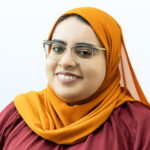
Zainab Al Maqrashi PGY5
Medical School: Sultan Qaboos University, Oman
Year Graduated: 2019
Why I chose this field: It is where the real integration of all faces of medical care takes place. You are the physician who examines and treats, the surgeon in knowing the limitations of a scalpel, the radiologist in being aware of what you need to use, and the pathologist who decides what information to hunt for.
Why I chose McMaster: McMaster is a perfect blend of clinical, academic and research opportunities with an exceptionally supportive and resident-focused program.
My Future Aspirations: I would like to be involved in medical education, the development of local community services, including rural accessibility to specialized oncology care in my hometown.
Favourite Pastimes: Live sporting events, outdoor activities, travel, astrophotography, puzzles, comics & graphic novels.
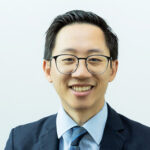
Samuel Chan PGY5
Medical School: The Temerty Faculty of Medicine, University of Toronto
Year Graduated: 2020
Why I chose this field: It is a unique specialty that takes the multi-systemic approach from internal medicine including both the diagnostic and treatment of complications skills with the molecular science of oncology. We care for a complex patient population and leverage both the science of medicine and the art of communication to provide compassionate and empathetic care.
Why I chose McMaster: The supportive program including our excellent program director and admin, opportunities for research and excellent teaching from all the oncology attendings
My Future Aspirations: To pursue a fellowship further specializing in a disease site such as thoracic oncology
Hobbies: Hiking, travelling and ramen.
Information Box Group

Melody Emamian PGY4
Medical School: University of Ottawa, Canada
Year of Graduation: 2021
Why I chose McMaster: I chose McMaster for its well-distinguished reputation in promoting a comprehensive understanding of cancer care, participating in cutting-edge research, fostering a positive learning environment, and prioritizing resident wellness.
What I am most looking forward to this academic year: As I embark on my training in Medical Oncology this academic year, I am excited about diving into the intricacies of cancer at a molecular level, gaining hands-on experience in cancer care, discovering the latest advancements in therapy, and learning from renowned oncologists and researchers. Above all, I am looking forward to making a profound impact in the lives of patients and families battling cancer, offering them hope and comfort throughout their journey.
My favourite pastime: I enjoy a variety of hobbies including traveling to explore new places, learning languages to connect with different cultures, and gardening to offer me relaxation. However, my absolute favourite hobby is baking – I am currently mastering the delicate art of macarons!
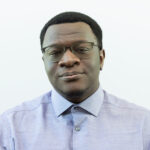
Mobolaji Adeolu PGY4
Medical School: Western University. Then I did Internal Medicine at University of Toronto (2024)
Year of Graduation: 2021
Why I chose McMaster: McMaster University’s Medical Oncology Program offers a diverse spectrum of cancer care experiences, catering to various patient demographics. It boasts access to state-of-the-art amenities and a wealth of resources. The program is renowned for its collaborative atmosphere and tight-knit community, emphasizing personalized career advancement and fostering a curriculum shaped by resident input and feedback. I am excited to join the community here.
What I am most looking forward to for this academic year: I am excited to delve deeper into the study of cancer physiology and evolving therapies, participating in groundbreaking cancer research, and developing my own oncology practice through the longitudinal clinic program.
My favourite pastime: I enjoy socializing with friends, spending time with my wife and child, rock climbing, playing video games and D&D, and checking out local galleries, pop ups, and exhibits.
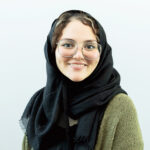
Khulud Natto PGY4
Medical School: Um-Al Qura University, Saudi Arabia
Graduation Year: 2017
Why I chose McMaster: McMaster University has an excellent medical oncology program that is highly regarded in Canada and internationally. McMaster’s oncology residency program provides extensive hands-on clinical training across a variety of oncology subspecialties, including medical, radiation, and surgical oncology. As most Residents train at the Juravinski Cancer Centre, which is a state-of-the-art facility that sees a high volume of cancer patients and offers cutting-edge treatment approaches. Overall, the medical oncology program at McMaster University is highly competitive and provides comprehensive training to prepare residents for successful careers in oncology. The program’s combination of clinical excellence, research opportunities, and dedicated faculty make it a top choice for aspiring oncologists in Canada.
What I am most looking forward to this academic year: My primary objectives of a medical oncology residency training program are to develop well-rounded, competent, and compassionate oncologists who are able to provide high-quality, evidence-based care to cancer patients.
My favourite pastime: My Culinary Adventures Cooking international cuisine is a passion of mine that has taken me on a delightful gastronomic journey around the world. As a hobby, I find great joy in immersing myself in the rich cultural traditions and unique flavors of different countries and regions… Beyond the culinary aspect, I also find great pleasure in the cultural learning that accompanies this hobby. Researching the traditions and customs that shape a cuisine helps me develop a deeper appreciation for the diversity of global food ways. Sharing these international dishes with family and friends also allows me to transport them to different corners of the world, sparking conversations and fostering cultural exchange.
Radiation Oncology Residency Program
Program Director: Dr. Justin Lee
Overview
Radiation oncology is a rewarding clinical specialty that includes hands-on multidisciplinary clinical care of cancer patients and mastery over sophisticated radiation treatment technology. It combines patient-oriented clinical skills with knowledge of the fascinating, ever-changing field of cancer biology, anatomy-based three-dimensional imaging competence and physics-based technical radiation treatment planning skills. Radiation oncology demands the development of competence in general medicine and palliative care, specifically in evidenced-based clinical oncology, it requires a commitment to excellent communication and collaboration skills and it provides an inclusive, supportive and inspiring multidisciplinary practice environment. Radiation oncology allows for a career focusing primarily on clinical practice or for a highly academic career combining practice with education, research and/or cancer control administration.
Radiation oncology training at McMaster University is a five year program, starting in PGY1, and mainly takes place at the Juravinski Hospital and Cancer Centre (JCC) in Hamilton. Clinical experiences also occur at the Hamilton General Hospital, McMaster Children’s Hospital and St. Joseph’s Hospital in Hamilton. Training includes general medical and surgical oncology training, training in diagnostic imaging, pathology, palliative medicine and emergency medicine, as well as extensive training in the evaluation and management of cancers in all body sites and specific radiation treatments related to those cancers. Training includes experience in adult and pediatric oncology. Trainees are required to do some training in a non-teaching Cancer Centre to experience the diversity of practice that exists in this specialty and have the opportunity to complete electives in centres in Ontario, elsewhere in Canada or beyond. Our trainees have completed electives in large and small centres all across Canada, in large US cancer centres, and in Uganda, Australia, Europe and the Middle East. Residents have dedicated training in applied medical physics, radiobiology and research methodology, and are required to complete and present a scholarly project. There are 25 radiation oncologists at the JCC and a large multidisciplinary group of physicians and allied health colleagues who make the atmosphere at McMaster collegial, motivating, inclusive and inspiring.
The Juravinski Cancer Centre houses contemporary radiotherapy technology, including an outpatient high dose-rate brachytherapy suite, a cyberknife unit, computerized tomography (CT) and magnetic resonance (MR)-simulators, an orthovoltage treatment unit, state-of-the-art linear accelerators with contemporary on-board imaging and sophisticated treatment planning technologies. Ours was the second centre in Canada to acquire a cyberknife unit, and our recently installed halcyon units are the first in Canada. Trainees are able to gain experience in all facets of established radiation treatment, as well as evolving technologies and techniques.
Hamilton has well-developed clinical multidisciplinary teams in gynecologic oncology, neuro-oncology, head and neck malignancies, hepatobiliary and gastrointestinal cancers, breast cancers, thoracic cancers, hematologic malignancies, skin cancers and genitourinary cancers, in addition to having one of Ontario’s few specialized sarcoma programs and the McMaster Children’s Hospital specialized pediatric oncology service. The Juravinski Hospital and Cancer Centre has dedicated inpatient and outpatient palliative care programs. Supportive care services at the Juravinski Cancer Centre include a regional genetics program with genetics counselling and testing, as well as social work, mental health and dietician support for patients. The JCC has an Indigenous patient navigator to service patients from the large local Indigenous populations living in Hamilton and within the region. Radiation oncologists at the JCC attend clinics in community hospitals in the region to bring care closer to patients in their own communities. Trainees attend such clinics, as well.
The academic Department of Oncology includes the clinical radiation oncology, medical oncology, malignant hematology and surgical oncology faculty, as well as non-clinical faculty in epidemiology and statistics. The Department of Oncology is very productive and collaborative with respect to clinical oncology research output. Faculty provide education, support, supervision and mentorship to trainees in research methods and the development and completion of scholarly projects.
Depending on research interests, other resources to support scholarship include:
- Supportive Cancer Care Research Unit (SCCRU)
- McMaster’s Department of Health Research Methods, Evidence and Impact (HEI)
- McMaster Education Research, Innovation and Theory (MERIT) Program
- Centre for Health Economics and Policy Analysis (CHEPA)
We are a full member of the Radiation Therapy Oncology Group (RTOG), an affiliate member of the Children’s Oncology Group (COG), an active participant in National Cancer Institute of Canada – Clinical Trials Group (NCIC-CTG) and are home to the Ontario Clinical Oncology Group (OCOG) and the Escarpment Cancer Research Institute (ECRI). The JCC has a large Clinical Trials Department, participating in intergroup trials, industry trials and in-house trials.
Residents are required to provide regular radiation oncology educational seminars to the inpatient Internal Medicine Housestaff, and to present at regular Journal Club meetings, morbidity and mortality rounds, clinical/pathology conferences and multidisciplinary case conferences. Many trainees also commit to longitudinal clinical skills teaching to undergraduate MD students and there are ad hoc opportunities to participate in education to undergraduate elective students. The collaborative atmosphere of the program results in frequent teaching of junior residents by senior trainees, both formally and informally. Many residents have identified opportunities for innovative educational initiatives, which have been adopted into the formal program.
Trainees in this program share a dedicated large, comfortable, bright space with ample computer resources for access to clinical and educational information and radiation treatment planning technology. Residents are financially supported to attend one Canadian Association of Radiation Oncology (CARO) annual scientific meeting and one American Society of Radiation Oncology (ASTRO) meeting during training, plus any North American meetings at which the trainee presents research. Trainees are also supported to attend the national prep course in PGY3, PGY4 and PGY5 to prepare for the Royal College exam and the London contouring boot camp once during training. Recommended physics and radiobiology texts are provided, as well as access to e-anatomy.
Wednesday afternoons are protected for education, which includes a weekly JCC-wide rounds followed by the academic half-day on a variety of relevant topics. Radiation physics is taught in a protected two week basics course in the fall followed by longitudinal sessions throughout the academic year, in the PGY2 and PGY3 years. A physics review week for senior residents is given annually. Radiobiology is taught through the University of Toronto annual radiobiology course in PGY2 and PGY4. An annual in-house written exam and semi-annual OSCE in PGY3, PGY4 and PGY5 help prepare senior residents for the Royal College fellowship exam, and dedicated one-on-one mock oral exams are given by faculty in the months leading up to the fellowship exam. Residents participate in, and lead, regular Journal Club meetings and JCC-wide morbidity and mortality rounds. Most importantly, resident work one-on-one with radiation oncologists throughout the PGY2-PGY5 years, acquiring the skills and knowledge required for a successful career in radiation oncology.
The division of radiation oncology is a collegial, diverse and inclusive group of 25 radiation oncologists who welcome our trainees into the specialty, supporting them educationally and personally through training. Residents each have a faculty mentor available for personal or professional support and additional mentoring relationships develop organically through training. The program director’s door is always open, physically and virtually. McMaster’s postgraduate medical education office has confidential support services for residents and access to a variety of supports to meet the needs of trainees. Most importantly, the resident group in the radiation oncology program creates a welcoming and mutually supportive training environment, supported by the program and the faculty to hold team-building and social events to ensure all residents thrive.
Transition to Discipline (PGY1)
Trainees will spend the first eight weeks of training in the Radiation Oncology Department in various clinical, treatment planning and delivery, and orientation environments.
Foundations (PGY1)
Trainees will spend the remainder of the PGY1 year in foundational training, including 12 weeks in general internal medicine and four weeks in each of thoracic surgical oncology, gynecology surgical oncology, emergency medicine, inpatient and outpatient palliative care, diagnostic imaging, neuro-oncology and inpatient oncology.
Core (PGY2 to PGY5):
Trainees will spend most of this stage of training working one-on-one with JCC radiation oncologists, gaining knowledge, experience and skill in each disease site, plus pediatric radiation oncology. There will also be protected time for focusing on learning the technical aspects of radiotherapy, applied radiation physics and radiobiology, protected time for scholarly work and dedicated clinical experiences in medical oncology, malignant hematology, community radiation oncology and clinical electives outside of the JCC.
Transition to Practice (latter PGY5):
This stage of training will comprise longitudinal clinical experience, practice management, completion of scholarly work and the development of independent decision-making and treatment planning to prepare for fellowship or independent practice.
Key Contacts
Justin Lee
Associate Professor
Interim Director, Radiation Oncology Residency Program
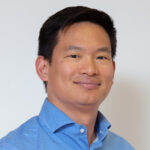
Justin Lee
Associate Professor
Interim Director, Radiation Oncology Residency Program
Justin Lee
Associate Professor
Interim Director, Radiation Oncology Residency Program
Justin Lee
Associate Professor
Interim Director, Radiation Oncology Residency Program
Current Radiation Oncology Residents
Information Box Group
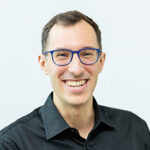
Daniel Schep PGY5
Medical School: University of Western Ontario, London, ON
Graduation Year: 2020
Why I chose this field: I love working in oncology because I can help guide patients through a very difficult part of their lives – it is a field that provides a lot of support and time to our patients. We work very closely with many other medical specialties and allied health, so we always feel like we are working in a team, not alone. I chose radiation oncology specifically because it also has a strong focus on anatomy, physics and technology that is exciting and rapidly changing.
Why I chose McMaster: McMaster has such a supportive and friendly group – I know this sounds like a cliché but it is true! Every day I am at work I get to spend with my friends.
Best part about the program at Mac: The program is very flexible and responsive to resident concerns. Every year the program takes suggestions that we have made to change to curriculum to better suit our needs, and rotation scheduling is very flexible to help maximize exposure where you feel it is needed.
Future Aspirations: I hope to be working in an academic centre and find balance between clinical work, education, and scholarly pursuits. In particular, I want to pursue research in communication around end of life and palliative care in oncology.
Fun Fact & Favourite Pastime: When I was growing up, my siblings and I were obsessed with The Simpsons and quotes from that show have irrevocably made their way into my vocabulary. If something I say seems out of place or not quite cromulent, that is probably why. When I was in grad school, I used to compete in Simpsons trivia every week. Also, I like to hike.
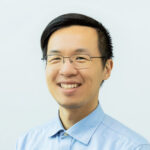
Spencer Hu PGY5
Medical School: University of Western Ontario, London, ON
Graduation Year: 2020
Why I chose this field: Radiation Oncology is a unique field that applies technological advances to treat patients throughout their cancer journey, whether it is for treatment for cure or alleviate symptoms. After much search, this specialty was the one field that best combines my love for technology and my passion for longitudinal patient-physician relationships.
Why I chose McMaster: I chose McMaster as it offers the most welcoming environment to pursue my many interests in medicine, including learning the fundamentals to becoming a great radiation oncologist, the opportunities to teach and research, as well as being close to home and support network.
Best part about the program at Mac: The most collegial and collaborative environment with staff physicians, other residents, and other support staff.
Future aspirations: Establishing an excellent practice that serves the needs of the growing patient population.
Favourite Pastime: It’s never too late to find new interests and activities – I’ve solo backpacked and skydived before, and recently started to learn how to ski.
Information Box Group
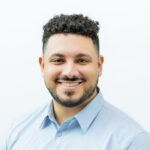
Rawy Shaaban PGY4
Medical School: Queen’s University, Kingston, ON
Graduation Year: 2021
Why I chose Radiation Oncology: Oncology patients are incredible and our interactions are very rewarding for me whether the treatment is curative or palliative. We also get to work with cutting edge technology and there is lots of variety in our day-to-day duties including clinical, procedural, collaborative, and academic work.
Why I chose McMaster: Proximity to friends and family, very supportive program director and program (resident feedback gets taken seriously and implemented very quickly), diverse city and patient population,
The best part about the program at Mac: The people.
Future aspirations: I envision myself working in a diverse practice that encompasses a broad range of technical applications within radiation oncology, including Stereotactic Body Radiation Therapy (SBRT) and brachytherapy. I anticipate providing care for a wide range of patient populations across all stages of disease.
Favourite hobbies: Cooking & photography.

Isaac Kong PGY4
Medical School: McMaster University (Waterloo Regional Campus)
Graduation Year: 2021
Why I chose Radiation Oncology: Radiation oncology is the best mix of oncology, imaging, and technology. The patient interactions are very rewarding.
Why I chose McMaster: Hamilton is close to family and friends and the program has a good service to learning ratio.
Best part about the program at Mac: We have very supportive staff physicians and a close-knit resident group.
Future Aspirations: I hope to be able to teach and mentor the next generation of medical students and residents.
Favourite Pastime: Cycling, board games, FOOD
Information Box Group

Adam Gabara PGY3
Medical School: Queen’s University, Kingston, ON
Graduation Year: 2022
Why I chose this field: The mix of anatomy knowledge with the technological aspects of Rad Onc was appealing to me, while also having long term relationships with patients, and working within a large team of nurses, radiation therapists/planner, and other specialists to arrange care for the patients.
Why I chose McMaster: Proximity to family and friends, the fun resident culture, supportive program, and getting to cycle in the nearby countryside.
Future Aspirations: Still trying to figure out career goals, but being able to see where AI takes our field is exciting.
Hobbies: Cycling, anything active indoor or outdoor really, reading, checking out new cafes and the food scene in Hamilton (which is absolutely bumping), cheering for McLaren on F1 race weekends!
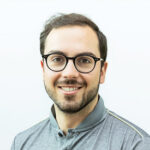
Francesco Fazzari PGY3
Medical School: University of Ottawa
Graduation Year: 2022
Why I chose Radiation Oncology: I chose McMaster because of the community environment and collegiality in the residency program. In addition, this specialty allows me to actively participate in the care of cancer patients during both the curative and palliative treatments we provide.
My favourite part about McMaster: How supportive the staff and residents are of each other.
Favourite hobbies: Cooking and cycling.
Information Box Group
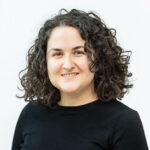
Libby Ben-Zvi PGY2
Medical School: McGill, Montreal, QC
Graduation Year: 2023
Why I chose this field: As an oncologist, we get to provide impactful care and support in what is often the hardest time in a person’s life. Radiation Oncology provides the added bonus of lots of cool tech! Did you know that the Cyber Knife is an automotive robot?!
Why I chose McMaster: The strong focus on resident learning and wellness.
Future Aspirations: Writing code that streamlines medicine and enhances patient care.
Hobbies: Taking care of my 60+ house plants and going on nature adventures with my dog.

Zuhayr Yakub PGY2
Medical School: Michael DeGroote School of Medicine, McMaster University, Hamilton, ON
Graduation Year: 2023
Why I chose Radiation Oncology: Radiation oncologists are fierce patient advocates, expert communicators, and medical experts who uniquely combine the art of medicine with the science of cancer pathophysiology, medical physics, radiobiology. I really loved the mix of all these factors and spoke to the reason why I wanted to pursue medicine.
Why I chose McMaster: I’ve been in Hamilton since I started undergrad, my family is nearby, and the culture of McMaster is so supportive! I’ve put down roots here and I genuinely think it’s a great place to live and explore.
Best part about the program at Mac: Apart from the people, the best part of Mac’s program is how malleable it is to the needs and desires of residents! Even just in my first year, I had some conversations with other residents about curriculum changes during first and second year that would be helpful (physics and rad bio learning earlier). These ideas and conversations were taken seriously and changes were made for my PGY1 year.
Future Aspirations: In 5 years I will hopefully have passed the Royal College Exam and enjoying my life near a mountain and an ocean (or doing a fellowship).
Something interesting about me: When I was 5 I got asked in school to draw what I wanted to do when I was older. I didn’t know how to draw a firetruck so I drew a stethoscope.
Information Box Group

Jennifer Hanuschak PGY1
Medical School: University of Ottawa, Ottawa, ON
Graduation Year: 2024
Why I chose McMaster for your residency: I spent six years living in Hamilton during my undergraduate and graduate studies, so the city really felt like a second home to me. I also chose McMaster for the incredible people that make up the program!
What I am most looking forward to this academic year: I am looking forward to my time on-service, exploring the different disease sites, learning from the expert staff, and getting to know patients.
My favourite pastime: I love being active with sports and going to the gym. This summer, I am hoping to play more tennis. I am also an avid skier and can’t wait for ski season!

Anna Katsev PGY1
Medical School: Michael DeGroote School of Medicine, McMaster University, Hamilton, ON
Graduation Year: 2024
Why I chose McMaster for your residency: The strong resident community, incredible program dynamics, and the opportunity to work with world-renowned physicians in the care of cancer patients.
What I am most looking forward to this academic year: Spending time learning from my excellent senior residents!
My favourite pastime: Pottery, building lego with my nephews and rollerblading.

Roland Chou
Medical School: University of Saskatchewan
Graduation Year: 2024
Why I chose McMaster: I spent my undergraduate years at McMaster and was excited to be closer to family and friends again during residency. The resident group and staff are very supportive, and I look forward to working with them as I learn to care for cancer patients.
What I am most looking forward to this academic year: Getting to know my co-residents and seniors, during and outside of work.
My favourite pastime: Origami, Gundam modelling, card collecting, sports, and video games!

